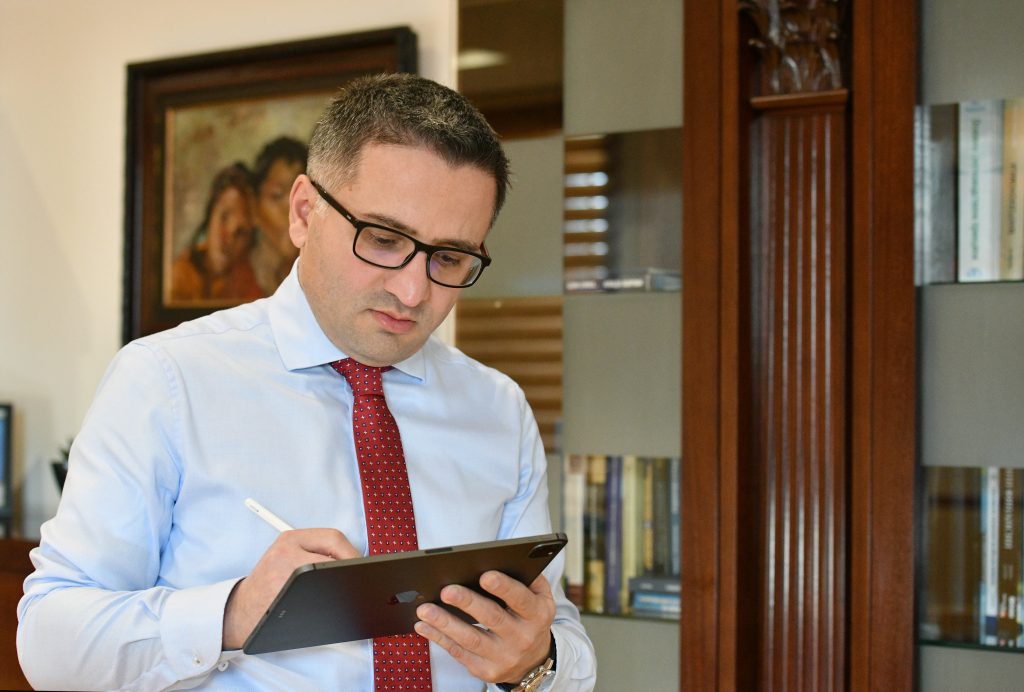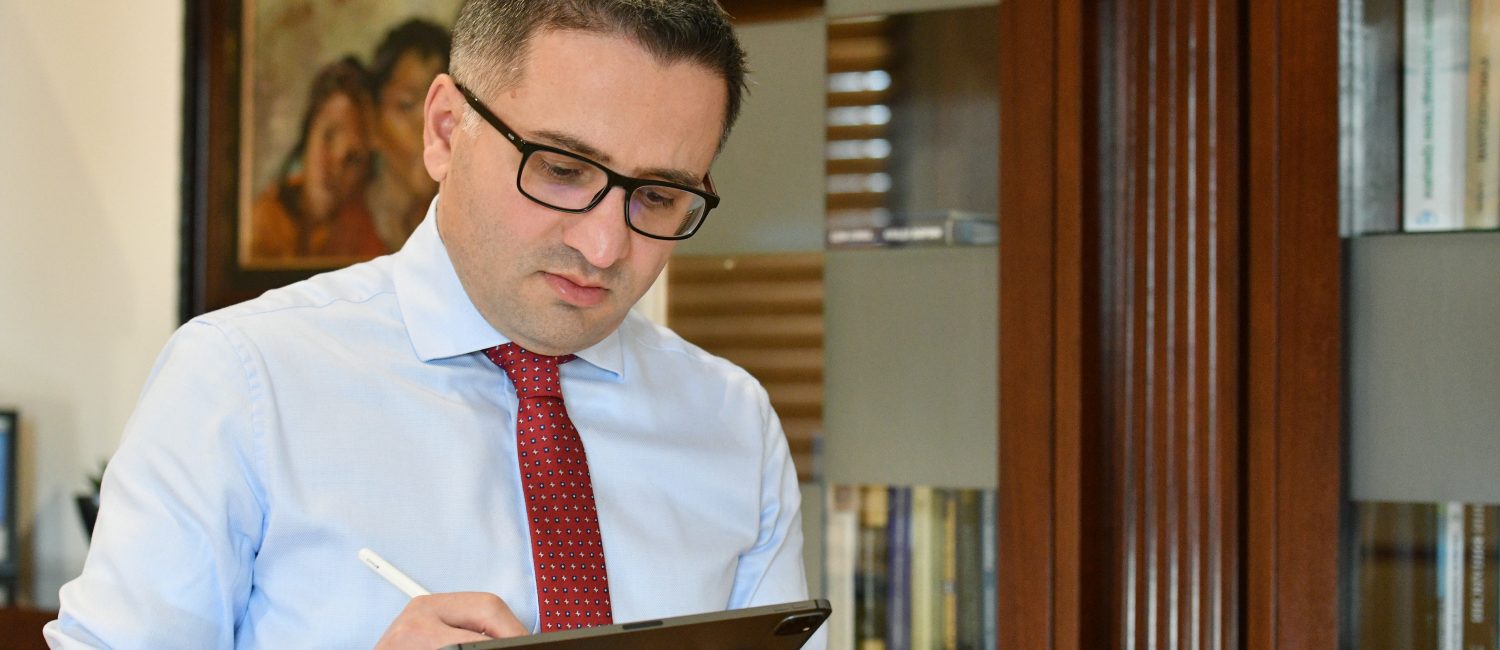15th May 2022, Skopje – With three doses of COVID-19 vaccine received, I tested positive last week, isolating myself for one week at home, when I wrote this column. Thanks to the technology, no activities were deferred and I held all scheduled meetings online. Compliments to the employees with the Ministry of Finance who were up to the task all along, as well as the top management whom we work as a team. But, my focus is on a completely different aspect of it all. We are already facing yet another crisis, energy crisis and inflation, as well as great uncertainty on the markets stemming from the war in Ukraine, with the previous crisis not yet ended, COVID-19 crisis is still present. Crises are overlapping which, as a cumulative, makes the situation one of the most challenging since World War II.

Overlapping crises
Aftershock – a quake, an effect following a previous large quake or more to the point, overlapping of crises. It best describes the ongoing developments in the global economy. This is an aftershock caused by the COVID-19 pandemic, additionally prompted by the geopolitical developments, which has reached its peak with the war in Ukraine. Coronavirus crisis is one of the worst economic crisis the world has faced since the Great Depression. Still, the global economy has quickly managed to get back on its feet. Following -3.1% contraction of the global economy in 2020, fast recovery followed in 2021, coupled with a robust growth of the gross domestic product of 6.1%. Because of the uncompromising, strong response of policymakers, the world has been able to overcome this crisis much faster and more effectively compared to the global financial crisis. It took only one year for the developed and the developing economies to get back to pre-crisis levels, unlike during the global financial crisis, when the blow, although weaker, lasted longer.
However, while the world and the economy were successfully recovering from the pandemic, yet another threat emerged – aftershock. As a result of the slowdown or complete halting of the economic activity, supply of goods and services on the global markets dropped. Even with the re-opening of the economy, the supply failed to respond to the fast-growing demand and, as a result, prices on the global stock markets surged, in particular prices of energy and some of the commodities. Still, other factors have also their role thereto. Several regional developments led to energy shortages, including the EU efforts to reduce CO2 emissions.
Soaring power prices on the global stock markets, including the prices of other commodities, have built up overall price pressures which rippled through the international markets in the national economies. Such pressures culminated after Russia launched invasion of Ukraine, taking into account the significance of Russia and Ukraine for the European and the global supply chains. Russia supplies almost 40% of Europe’s natural gas and 25% of its oil, while Russia and Ukraine together account for one third of the global wheat exports, one fifth of global corn exports and 80% of global sunflower oil exports.
All this has resulted in increase of inflation rates, which have broken the records in many economies set several decades ago. According to the International Labour Organization (ILOSTAT), the annual inflation rate worldwide, as measured by the consumer price index (CPI), accelerated to 9.2% in March 2022, up from 7.5% in February 2022, 6.8% in January 2022 and 6.4% in December 2021. Just as you know, inflation rate was constantly low, even too low, in the past decade, with some central banks struggling to bring inflation up to target. In April, IMF forecasted inflation of 5.7% in average in the advanced economies and 8.7% in the emerging market and developing economies in 2022, a jump of 1.8 p.p. and 2.8 p.p. from January’s forecast.
Simultaneously with the rising price pressures, driven primarily by the soaring prices of energy products, food and some other commodities, the prospects for growth of the global economy are deteriorating. IMF forecasts global growth to slow from 6.1% in 2021 to 3.6% in 2022 and 2023. It is a downward revision by 0.8 and 0.2 p.p. in relation to January’s forecast, i.e. following the beginning of the war in Ukraine. However, according to the baseline scenario, economic growth will be in the positive zone this year as well, as is actually the case with the aftershock, which is weaker than the initial one.
Inevitable triangle for the economic policy makers
War in Ukraine has placed the policy makers in a crucial dilemma. Managing the inflation is on one hand, while trying not to suppress the economic recovery on the other. Also, measures and support to the vulnerable categories are put in place on one hand, with strengthening the financial buffers, consolidation and debt stabilization on the other.
Both the International Monetary Fund and the World Bank suggest that fiscal policy is to be adjusted to the level of economic exposure to the war in Ukraine, the pandemic itself and the recovery of the economy. Due to the needed fiscal expansion in many countries during the pandemic, the debt has reached all-time record high level. Moreover, as a result to central banks’ response to the price pressures by tightening the monetary policy, governments are facing high interest rates on the capital markets. Still, the need for consolidation should not prevent the governments to give priority to the adequate supporting measures for the standard of the vulnerable categories, in particular those susceptible to the price pressures, and to measures to protect the economy.
Faced with crises, one after the other, as well as with the challenge to stay on the course with the set ambition for growth and development, the triangle inevitably imposes itself in achieving these three goals: managing the crisis, maintain the growth and fiscal consolidation. Thereby, the crisis requires prompt reactions and incurs additional budget costs, sustaining the growth requires consistent policies and reforms to yield effects on the long run, while the fiscal consolidation is conditio sine qua non on the medium term.
From the point of view of public financial management, achieving the goals of the inevitable triangle necessitates budgetary interventions: on the expenditure side – expenditure cuts and their reprioritizing, on the revenue side – reforms for greater efficiency and consolidation, and in terms of financing – sustainable instruments.
Supplementary Budget: Funds for new measures and cuts wherever possible
As a small and open (140% of GDP trade openness), our economy is susceptible to the global economic developments, in particular the developments in the EU economy. Russia-Ukraine crisis, was indirectly, via the European economy, reflected in our country as well. Channel through which this crisis is already being felt is the rise in the prices of commodities, especially food and energy products. In fact, in April, inflation rate recorded its highest rate (10.5%) since the beginning of the nineties. Other channels through which this crisis may be reflected on our economy are trade disruptions, undermined consumers’ confidence, and thus reduced consumption, tightening of the international financial markets. Accordingly, the expectations about this year’s growth cannot correspond to the GDP growth projected under this year’s Budget, being adopted prior to the developments in Ukraine, accounting for 4.6%. As per the expectations by the international financial institutions, this year, GDP growth is forecast to account for around 3% in average (3.2% as per IMF, 3% according to EBRD and 2.7% as projected by the World Bank). Still, the outcome will depend solely on the further developments in Ukraine, the type of new sanctions to be imposed on Russia and the reflection therefrom on our major EU trading partners.
However, one thing is clear, the budget needs to be restructured in order to adequately respond to the newly occurred situation. Ministry of Finance is already consulting with the respective institutions about the degree of project implementation, as well as the execution of the current expenditures. What I can say with certainty as a Minister of Finance is that we will be extremely conservative, cuts will be made wherever possible. This will make more room for new actions and measures, which, given the situation, will probably be needed again.
As of the onset of the crisis, the actions taken by the Government in the form of measures geared towards supporting the economy and the citizens amounted to EUR 615 million. This amount is among the strongest responses to the crisis in the region. Croatia has allocated around EUR 635 million, Greece has allocated EUR 500 million, with Slovenia and Albania providing approximately EUR 200 million each therefor, etc. As a Government, we aim to provide support to the citizens, above all the vulnerable categories, preserve the health of the economy and overcome this crisis, thereby getting back the economy to the growth trajectory, all to the end of attaining the desired goal – higher and sustainable economic growth rates.
Deficit financing and consolidation in the medium term
We remain committed to maintaining the fiscal consolidation. In the medium term, once the crisis is overcome and the economy is fully recovered, the fiscal deficits will be gradually narrowed, all to the end of the not quashing the growth, thus reducing it to the level prescribed by the Maastricht criteria.
Announcements about the ongoing financing of the deficit via instruments with the lowest possible costs already speak in favour thereof. As I mentioned above, the cost of capital on the markets will yet to be increased as a result of the further tightening of the monetary policy while striving to decrease the inflationary expectations, as well as stabilize the inflation rates. European Central Bank has discreetly announced an increase in its policy rate as of July, while the US Federal Reserve, the Bank of England and several central banks in Europe have already raised their policy rate at several occasions. Hence, although it was initially planned for the Republic of North Macedonia to issue Eurobond, taking into account the developments on the capital market (in April, Croatia issued Eurobond worth EUR 1.25 billion for a period of 10 years with coupon interest rate of approximately 3%), we opted for financing via earmarked instruments of the international institutions.
IMF Precautionary and Liquidity line is aimed at providing funds at the lowest possible cost, this being a positive signal on the financial markets. This speaks in favour of our economy as stable and based upon sound macroeconomic fundamentals, since IMF allocates PLL solely to countries with sound economies. In fact, during the very approval process of this instrument, in addition to the country being positively assessed under the latest IMF mission, the monetary policy, the fiscal policy, the financial sector stability and supervisions, as well as the adequacy of the statistical data are also being assessed thereby. In case of substantial vulnerabilities in either of these categories, the instrument cannot be allocated thereto.
Moreover, funds are planned to be provided via the specific project credits by the World Bank and EBRD. All these instruments and lines are very favourable financing sources, cheaper when compared to the ongoing terms and conditions of the international capital market, whereby our country should probably issue Eurobond thereon. Thereby, we attentively monitor the amount of the public debt in the medium and long run, its sustainability, and certainly the purpose of the respective funds. Borrowed fund should be intended for the priority areas in view of the economic development (as indicated below), which will generate positive multiplier effects on the domestic economy.
Strategy aimed at improving budget revenue collection
For the purpose of implementing fiscal consolidation, upon overcoming the crisis, in addition to the expenditure side, actions will be also taken for improving the revenue collection via realizing the Tax Reform Strategy. Its main objective is to ensure fair, efficient, transparent and modern tax system based on contemporary digital technologies and innovations in the field of taxation, all to the end of attaining an accelerated, inclusive and sustainable economic growth.
This Strategy incorporates five priorities, with the first one being: greater fairness of taxation, in order to ensure that everyone meets its social obligation and pays its fair share of tax. This is expected to result in a newly designed fair taxation model. The second priority is increased efficiency and productivity of the tax system for the purpose of improved revenue collection, via more efficient fight against illicit activities and tax evasion, and a strengthened institutional capacity, analysis and finalization of the tax base, as well as reduction of the tax arrears. Third priority is increased tax transparency, including improved exchange of information among tax authorities and other entities, to be primarily based upon electronic services and digitalized processes. The fourth priority includes better-quality services, while the last one is introduction of environmental (“green”) taxation, aimed at encouraging the taxpayers to reduce the activities, which cause environmental pollution.
Crisis as an opportunity: structural reforms, green transition, digitalization and human capital
Continuation of the structural reforms while coping with the ongoing crisis is what both WB and IMF recommend. Responding to the present challenges, as well as building an economy resilient to the future ones, is the only way of achieving the desired outcome – higher and sustainable economic growth rates, which will contribute to higher living standard and economic development.
The debate at the platform for development of solutions SEFF or Skopje Economic and Financial Forum, which will be held at the end of this month, is also focused thereon. Topic to be discussed at SEFF will be titled “Preserving Economic Growth in Times of Uncertainty and Afterwards”, which rest upon four pillars: 1. Macroeconomic challenges in times of crisis, 2. Sustainability, competitiveness and regional cooperation, 3. Energy, green transition and infrastructure and 4. Upon the crisis: structural reforms, human capital, financial innovations and investments.
The purpose of this Forum is to encourage all actors, policy makers, as well as the respective stakeholders – all together, to offer, by providing their opinions, solutions, that will be a good response to both the crisis and what follows afterwards.
To my great pleasure, the main speaker of the Forum will be the winner of the Nobel Prize for Economics in 2008, the American Professor Paul Krugman, who will, via his analyses, enrich this already enough complex discussion, thus undoubtedly brining the necessary benefits.
Although this will be a really busy period of the year, given that we are working on the Supplementary Budget at the same time, I look forward thereto, since only by struggling for fresh ideas and opinions, real solutions can be reached.
Finally, I would like to point out one more thing – only with a good strategy and substantiated plan in place, the desired results can be attained. The economic strategy we have implemented so far has successfully rescued us from the pandemic crisis, which was also recognized by all relevant international financial organizations. I am certain that we will manage to overcome the aftershock as well. We are going to build a better future!
Fatmir Besimi, Minister of Finance
















